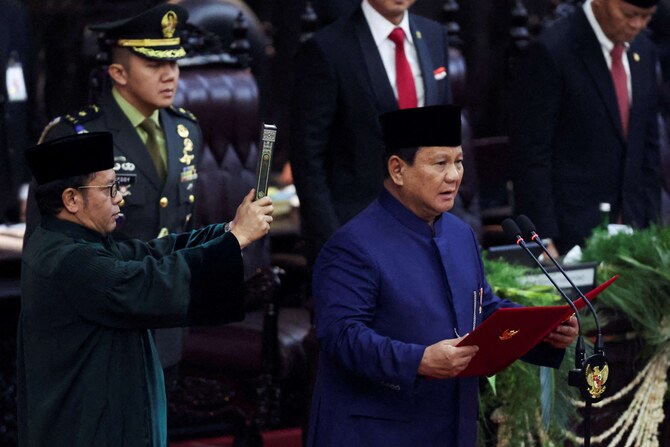JAKARTA: Indonesia’s former defense minister Prabowo Subianto was sworn in as the country’s eighth president on Sunday morning, becoming the new leader of the world’s third-largest democracy.
The 73-year-old former special forces commander and former son-in-law of Indonesia’s late dictator Suharto won the Feb. 14 election with almost 60 percent of the vote. He succeeded Joko Widodo, who stepped down on Sunday after serving two five-year terms.
Subianto took the oath of office during a nationally televised special session of the People’s Consultative Assembly, followed by his vice president and Widodo’s eldest son, Gibran Rakabuming Raka.
The ceremony was attended by heads of state and special envoys of more than 30 countries.
In his first presidential speech, Subianto vowed to work toward achieving food and energy security, while promising to eradicate corruption.
“We will lead the leadership of Indonesia … sincerely, by prioritizing the needs of all Indonesians, including those who did not vote for us,” he said.
Indonesia’s new leadership will face a number of challenges, analysts say, including a shrinking middle class and regional security issues.
The Subianto presidency will begin amid a period of democratic backsliding that Widodo oversaw, marked by a rise in old-time patronage and dynasty politics, and a dent in the independence of the judiciary.
DEMOCRACY IN DECLINE
“Our democracy has seriously declined … we are not doing alright at all. There are many democratic institutions that were quashed during Jokowi’s presidency,” constitutional law expert Bivitri Susanti told Arab News.
“I don’t think we can separate between Jokowi and Prabowo. Take note of how Prabowo ran for the presidency three times, and he won only now, after Jokowi gave his son as a running mate ... the upcoming administration will be tied because its victory was guaranteed through unconstitutional acts.”
Susanti was referring to how Raka’s candidacy only became possible after the Constitutional Court, which at the time was headed by Jokowi’s brother-in-law, made a controversial decision to decrease the minimum age requirement for the role.
SHRINKING MIDDLE CLASS
While one of Subianto’s election promises was to accelerate economic growth to 8 percent from a current rate of 5 percent, the number of Indonesians classified as middle class has declined from about 57.3 million people in 2019 to 47.8 million this year, according to data from the Central Statistics Agency.
This decline means more people are in the “aspiring middle class,” which now comprise about 50 percent of the Indonesian population, or more than 137 million people.
The numbers indicate a decrease in purchasing power across Indonesia.
“There is a purchasing power problem we are facing and there’s the raising of the big question about the structure of the Indonesian economy right now, as the industry is slowing down and (there are) a lot of layoffs in the manufacturing sector,” Bhima Yudhistira, director of Jakarta-based think tank the Center of Economic and Law Studies, told Arab News.
‘MORE ACTIVE’ FOREIGN, DEFENSE POLICY
Jokowi, who never attended the UN General Assembly during his time in office, was not known as a “foreign policy president,” as he focused more on economics and domestic developments, said Pieter Pandie, international relations researcher at the Centre for Strategic and International Studies in Jakarta.
But that leadership style is likely to change under Subianto, who has already visited a number of countries as president-elect, including China, Australia and Saudi Arabia.
“In the transition to Prabowo, we’ll see a more active president, a more hands-on president in foreign policy and defense policy,” Pandie said.
Indonesia’s active support for Palestine, which under Widodo was driven by the foreign minister, Retno Marsudi, is also likely to continue. In his inaugural speech, Subianto again declared Indonesia’s support for Palestinian independence.
“I think the difference will be Prabowo will likely be a little more active in inserting a role for Indonesia in the region, although it remains to be seen what kind of role.”
As Indonesia holds control over critical sea lanes, including in the Malacca Strait, Lombok Strait and Sunda Strait, the government will need to prepare for possible regional security issues such as conflict in the South China Sea or Taiwan Strait.
Beijing has overlapping claims over the South China Sea with a number of countries, and has increased its activities over the strategic waters, despite a 2016 international tribunal ruling that rejected Chinese claims.
The East Asian giant also has claims over self-governed Taiwan, and has launched major military drills around the island, sparking concerns of a bigger conflict.
“We’ve seen increasing incidents between China, the Philippines, Vietnam and others that could very well erupt into a conflict,” Pandie said, adding that conflict spillover, refugee crises and disruptions to maritime routes are several potential issues that Indonesia may have to contend with.
“Given our non-alignment and neutrality we won’t be involved directly in a conflict, but should a conflict arise so close to our borders … many things could happen.”






















